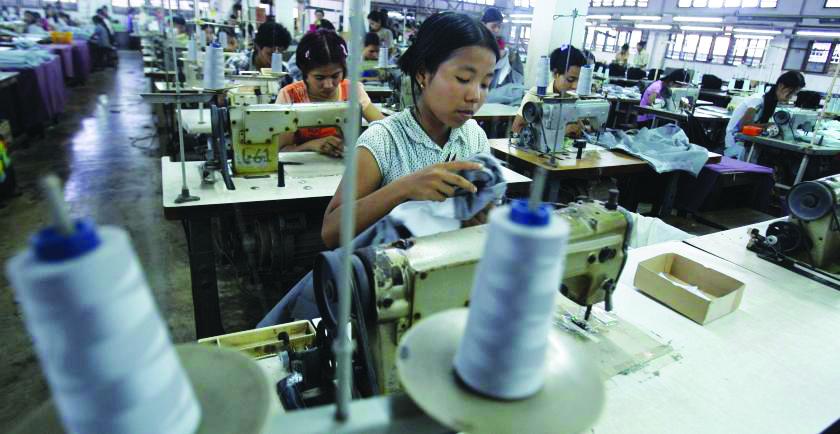Myanmar expects to increase EU garment exports by 13 percent if Myanmar doesn’t lose GSP
13 พฤศจิกายน 2561
Myanmar expects its garment exports to EU, which is now 47 percent of the total gar-ment export, increased by 13, according to Daw Khiang Khaing Nwe, Joint Secretary of Myanmar Garment Manufacturers Association, at the press conference on Novem-ber 30.
“Our exports to the EU from Cut-Make-Pack (CMP) factories account for 47 percent of the total export. In 2018, exports to the EU increased significantly. If we can keep this momentum, the EU will account for 60 percent of Myanmar’s total garment export in 2019,’’she said.
Myanmar’s garment sector went flat when the U.S and Western countries imposed economic sanctions. Myanmar’s garment export suffered badly in 2001, and was $400 million, while Vietnam’s garment sector was exporting $1.3 billion worth of garment products.
In 2012, Myanmar’s garment export surged to $900 million, and after EU granted My-anmar GSP in 2013, garment exports increased by 33 percent. This in turn encour-aged investments from China and South Korea.
The rapid growth of garment sector is mainly caused by EU’s GSP and Myanmar ex-ports garments mainly to Japan, the European Union, the United States, and South Korea.
In 2017, garment exports from CMP factories generated $2.7 billion, and stakeholders in the sector assumed that the export could reach over $3 billion in a few years if the momentum is kept steady.
EU’s GSP
If the European Union removes its GSP to Myanmar, it would badly effect women in the garment sector; 90 percent of its workers are women, said Daw Khaing Khaing Nwe, Joint Secretary of Myanmar Garment Manufacturer Association, at a press conference held on October 30 at UMFCCI.
The EU’s Generalized System of Preferences (GSP) system is a preferential tariff system which provides for a formal system of exemption from tariffs for underdeveloped countries. Losing these rights for Myanmar could spell disaster for women in Myanmar.
“90 percent of the five million workers in the sector are women, over 25 percent of them are supervisors, and 38 percent of the factory owners are women. This is special and unique! You will not see it in other countries.”
Myanmar once faced such trade sanction by the U.S. about 15 Years ago, which re-sulted in the closure of over 150 garment factories. Over 80,000 women and 8,000 men lost their jobs. Sadly that caused thousands of women to be sexually exploited in Thailand and China, she said citing the data from American researchers.
Currently, a worker in the garment sector is bringing home around $60 to $70 from their income. So, it would be around $32 million based on around 500,000 workers, she said.
Protecting the European Union’s GSP rights to Myanmar essentially means protecting Myanmar women.
(Myanmar Business Today: https://www.mmbiztoday.com/articles/myanmar-expects-eu-garment-exports-increase-13-percent-if-they-don-t-lose-gsp )











